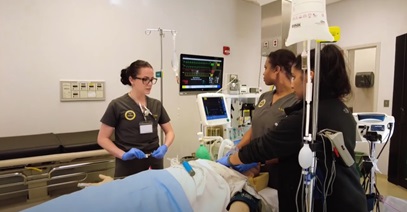
In modern healthcare, technology has become crucial to patient outcomes and care. Health informatics is a vital part of this technological revolution, and several of our healthcare and nursing programs include an optional or required course in this field. We even have a Master of Science in Nursing specialization and a Post Graduate Certificate in Nursing Informatics. But what exactly is health informatics, and how does it impact healthcare workers? Let’s explore.
The Role of Health Informatics
Health informatics lies at the intersection of healthcare, information technology, and data science. It involves collecting, storing, analyzing, and managing data to improve patient care, enhance efficiency, and advance medical research. By looking at healthcare data in large quantities, we can find ways to make better decisions for patients. We can also use data-based insights and technology to improve communication and healthcare processes.
Professions that Use Health Informatics
Many healthcare workers use health informatics in their jobs. Here are a few examples.
Healthcare Administrators: Healthcare administrators use health informatics systems to manage patient records, schedule appointments, and coordinate services within healthcare facilities. They rely on electronic health records (EHRs) and other digital tools to streamline administrative tasks and workflows.
Health Information Technicians: Health information technicians maintain and organize patient information in electronic systems. They ensure the accuracy, security, and accessibility of healthcare data. These professionals are critical to protecting patient privacy and confidentiality.
Clinical Informaticists: Clinical informaticists are nurses and healthcare professionals with skills in clinical medicine and information technology. They work to add technology to clinical practice and make technology systems more usable. They also help create and implement administrative solutions and decision support tools that assist providers in delivering quality care.
Data Analysts: Data analysts study large datasets to find patterns and meaningful insights that can support clinical decision-making and healthcare policy development. For example, in public health, they may look at statistics on disease outbreaks or environmental risks and population impacts. Their work can help improve patient outcomes, lower costs, and enhance population health.
The Impact of Health Informatics
Health informatics has transformed healthcare in many ways. By harnessing the power of technology and data, healthcare organizations have found ways to:
- Use health information and decision support tools to improve patient safety and quality of care
- Automate routine tasks and streamline workflows to enhance efficiency and productivity
- Empower patients to actively participate in their healthcare by providing access to personal health records and online resources.
- Facilitate medical research and innovation by providing data-driven insights and increasing collaboration among healthcare professionals and researchers.
As we’ve shown, health informatics can help improve patient care, optimize processes, and drive positive outcomes for individuals and communities. Over time, the increased use of health informatics will be pivotal to providing better, safer, and more accessible healthcare around the globe.
Learn more about Healthcare
South University offers programs in nursing, public health, pharmacy, and a wide range of healthcare fields. Request information to speak with an Admissions Representative about your interests and goals today.
*South University does not promise or guarantee licensure, employment, or salary amounts.
Not all programs are available at all locations.




